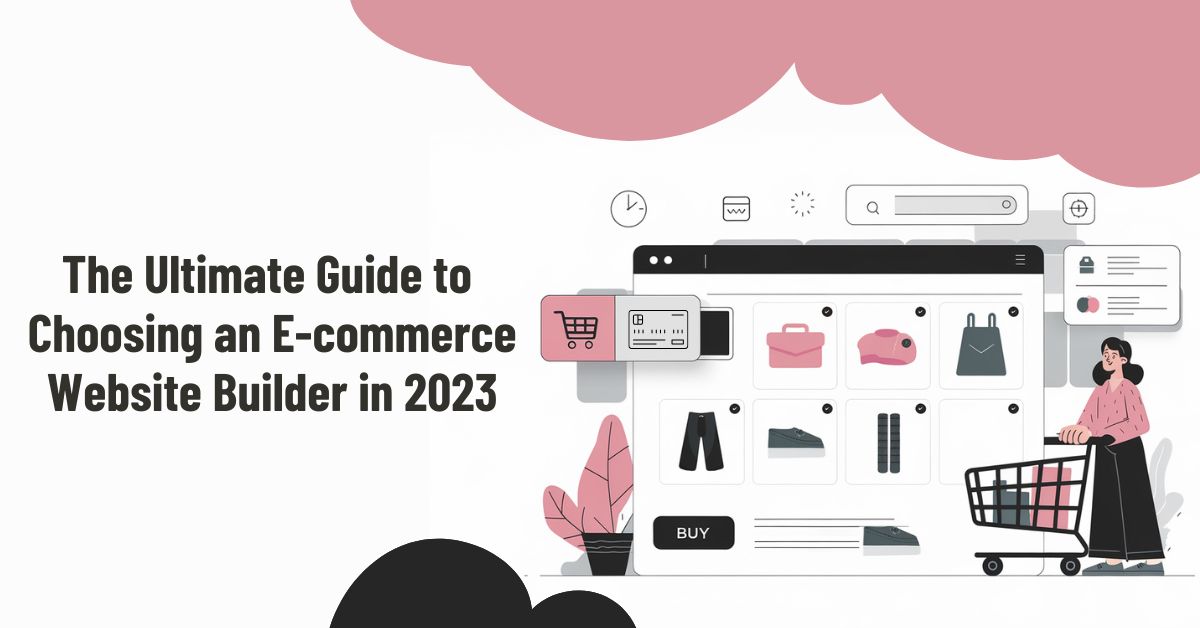# The Ultimate Guide to Choosing an E-commerce Website Builder in 2023
## Introduction to E-commerce Website Builders
In the rapidly evolving landscape of digital commerce, having a robust e-commerce website is no longer a luxury; it’s a necessity. An **e-commerce website builder** is a tool that enables users to create online stores effortlessly, integrating essential features such as product listings, shopping carts, and payment gateways, all without the need for extensive programming knowledge. The importance of selecting the right e-commerce website builder cannot be overstated, as it dictates the functionality, aesthetics, and overall success of your online business.
With a plethora of options available, ranging from basic to highly sophisticated platforms, choosing the right e-commerce website builder can be daunting for many business owners. Each platform offers a unique set of features, advantages, and trade-offs, making the decision-making process complex. This guide aims to simplify that process by exploring vital considerations and top options to help you make an informed decision.
## Key Features to Look for in an E-commerce Website Builder
### Customizability and Design Options
One of the first considerations when choosing an **e-commerce website builder** is the level of customization and design flexibility it offers. A visually appealing, brand-consistent design can significantly enhance user experience and conversion rates.
– **Template Variety:** Choose a builder with a large array of templates. This diversity allows businesses to find a design that closely aligns with their brand aesthetic.
– **Design Flexibility:** Look for **drag-and-drop** editors that provide freedom to modify layouts easily. This functionality is crucial for businesses that want to stand out or have specific design requirements.
– **Mobile Responsiveness:** Ensure that templates are mobile-responsive to cater to users accessing your store via smartphones or tablets.
– **Custom CSS/HTML Access:** For businesses needing precise control, access to code for further customization can be advantageous.
### Payment Gateway Integrations
Efficient **payment gateway integrations** are crucial for seamless transactions. As an online business, catering to a global audience requires a diverse array of payment options to accommodate different buyer preferences.
– **Multiple Payment Options:** Support for various payment methods, including credit cards, PayPal, and digital wallets like Apple Pay or Google Pay, widens your potential customer base.
– **Security:** Ensure that the builder supports advanced security measures like SSL certificates to protect customer data.
– **International Currency Support:** It is essential for reaching a global audience. The ability to transact in multiple currencies can enhance user experience and trust.
### Mobile Optimization
In today’s digital age, mobile commerce is soaring to unprecedented heights. Therefore, **mobile optimization** is non-negotiable when selecting an e-commerce platform.
– **Responsive Templates:** Integration of responsive templates that adapt seamlessly to mobile and tablet screens is critical for maintaining a professional look on all devices.
– **Fast Loading Times:** Slow sites can severely impact user experience and sales. The builder should prioritize performance optimization for both mobile and desktop users.
## Top E-commerce Website Builders for 2023
When it comes to choosing the best **e-commerce website builder**, several options stand out due to their robust features, ease of use, and ability to scale with your business.
### Shopify
Shopify is a leader in the e-commerce space, renowned for its comprehensive features and scalability.
– **Ease of Use:** Shopify offers a user-friendly interface that is accessible even to those with limited technical skills.
– **App Integrations:** An extensive app store allows for the incorporation of additional features as your business grows.
– **SEO Tools:** Built-in SEO features help improve your site’s visibility on search engines.
#### Comparison Table
| Feature | Shopify |
|---|---|
| Templates | 70+ |
| Payment Options | Shopify Payments, PayPal, etc. |
| Mobile Optimization | Yes |
### WooCommerce
An open-source platform, WooCommerce is ideal for those using WordPress.
– **Customization:** Known for its high degree of customization.
– **Plugins:** Thousands of plugins available to enhance store functionality.
– **Community Support:** Large community of developers for troubleshooting and advice.
### BigCommerce
BigCommerce caters to businesses looking for extensive features and flexibility.
– **Scalability:** Suited for businesses poised for rapid growth.
– **Built-in Marketing Tools:** Features such as banners and discounts for customer engagement.
– **Security:** High-level security features included.
### Wix eCommerce
Wix eCommerce combines simplicity with powerful tools.
– **Beginner-friendly:** Easy for beginner store owners to navigate and set up.
– **Design Flexibility:** Offers dynamic design templates.
– **Affordability:** Competitive pricing for small businesses.
### Squarespace
Squarespace is renowned for its stunning design templates and ease of use.
– **Design Focus:** Known for beautiful templates.
– **Marketing Tools:** Features for email marketing and social sharing.
– **Integration:** Supports basic integration with third-party services.
## How to Choose the Right E-commerce Website Builder for Your Business
Selecting the perfect **e-commerce website builder** for your business involves more than just looking at the surface features offered by each platform. Here’s how to narrow down your choices:
– **Define Your Needs:** Determine what features are crucial for your store, such as payment methods, shipping options, and integrations.
– **Budget Consideration:** Assess the initial and ongoing costs. Some platforms charge transaction fees, which could add up over time.
– **Scalability:** Ensure the platform can grow with your business, accommodating future needs like more products or higher traffic.
– **Customer Support:** Evaluate the level of customer service, including availability of live chat, phone support, or a resource center.
– **User Experience:** Test the user interface and checkout process to ensure it’s intuitive and user-friendly.
> “The right e-commerce builder can be a key driver of growth for your online store. Make your selection based on detailed analysis and business needs.” – Expert Advice.
## Conclusion
Choosing the right **e-commerce website builder** is pivotal for establishing and growing your online presence. With numerous options available, the decision should be based on specific business needs, budget constraints, and desired features. By considering essential factors like customizability, payment gateway integrations, and mobile optimization, along with insights into the top builders like Shopify, WooCommerce, and BigCommerce, you are better equipped to make an informed choice. The right platform will not only cater to your current needs but also scale with your business, enabling long-term success in the competitive world of e-commerce.
Optimize your journey in the e-commerce world by selecting the builder that best aligns with your vision and goals. How crucial is customization versus budgeting for your e-commerce venture? Share your thoughts and experiences in the comments below!
[Read more about empowering your e-commerce store here.](#)




